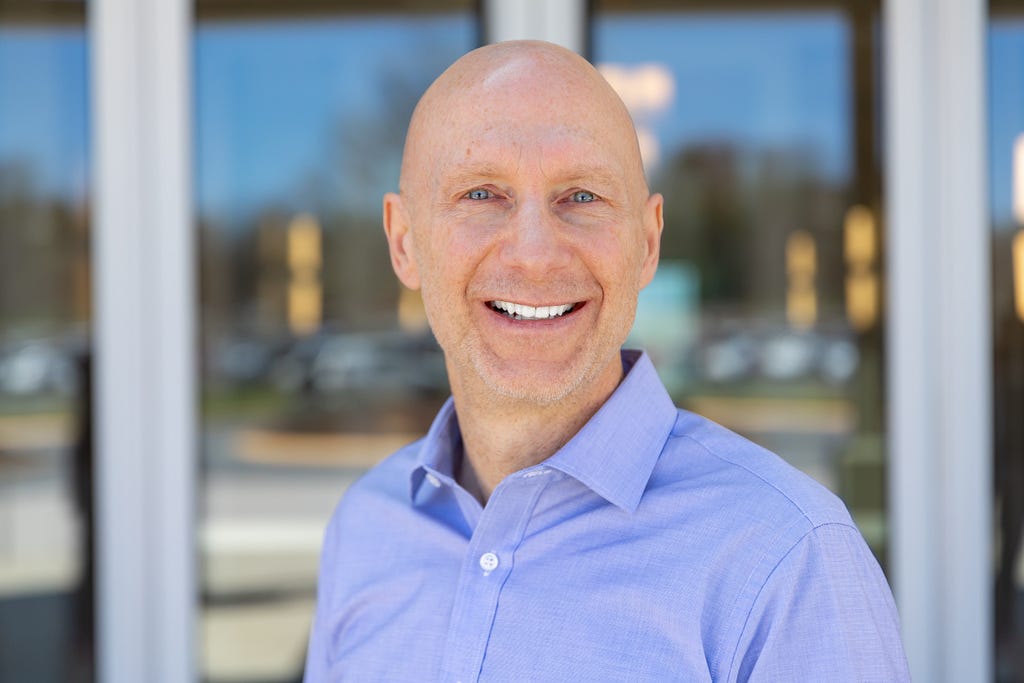TEDx Talking: Craig Richard of Shenandoah University On What You Need To Know To Secure, Prepare, and Deliver a Highly Effective TEDx Talk

Know what to do with your feet. Don’t stay in one spot and don’t pace back and forth. I created a map on the floor based on the sections of my talk. When I started a new section of my talk, I would take 2 steps and stand in that new area until I got to the next section of my talk. It helped me to remember my talk and move about the stage appropriately.
In a world that is more connected than ever, the power of a well-crafted message to inspire, educate, and evoke change cannot be understated. TEDx Talks have emerged as a prestigious platform for sharing ideas worth spreading, reaching a global audience and creating impact on a grand scale. In this series, we are discussing the process of delivering a TEDx Talk that resonates and leaves a lasting impression. We are talking with experts who have successfully navigated the TEDx journey, including TEDx speakers, speaking coaches with a focus on TEDx preparations, and organizers involved in the selection and coaching of speakers. As part of this series, we had the pleasure of interviewing Dr. Craig Harris Richard.
Dr. Craig Harris Richard is presenter of the TEDx Talk, ‘Whispered Revolution of Relaxation’, which has been viewed over 2 million times. He is also the co-author of a brain scan study of Autonomous Sensory Meridian Response (ASMR), founder of ASMRUniversity.com, author of the book ‘Brain Tingles’, and host of the podcasts ‘Sleep Whispers’ and ‘Calm History’. His research and interest in ASMR have been featured by ABC, CBS, NBC, FOX, CNN, NPR, Al Jazeera, Associated Press, NY Times, Washington Post, Boston Globe, Newsweek, The New Yorker, Scientific American, Women’s Health, Rolling Stone, The Today Show, and others. Dr. Richard is currently a professor at the Bernard J Dunn School of Pharmacy, Shenandoah University, Virginia, USA.
Thank you so much for your time! I know that you are a very busy person. Our readers would love to “get to know you” a bit better. Can you tell us your “Origin Story”? Can you tell us the story of how you grew up?
I was born and raised in eastern Massachusetts, resulting in my constant overuse of the words ‘wicked’ and ‘super’. I received my Ph.D. from Albany Medical College in New York and did my postdoctoral training at the University of Pittsburgh — School of Medicine. Although I have tried to leave it behind, my Boston-accent has traveled with me.
Can you tell us a bit about what you do professionally, and what brought you to this specific career path?
I’m currently a professor of biopharmaceutical sciences at Shenandoah University in Virginia. When I was a college student I loved biomedical topics but I felt my professors made these interesting topics very dry. So, I decided to become a professor and teach these topics with a bit more spice and flair, and a dash of silliness.
Thank you for all that. Let’s now turn to the main focus of our discussions. Can you tell us a bit about your particular experience with TEDx talks? Before we talk about the details, let’s consider the big picture. Preparing for a TEDx talk and securing it obviously requires a lot of mindshare, bandwidth, resources, and energy. From your personal experience, why is it worth it to invest all that to do a TEDx talk?
Yes, I did find it worth it to invest the time I did into my TEDx Talk. My time investments were creating my script, improving my script, and then practicing the delivery of my final presentation. I probably invested about 15–20 total hours of preparation. The hardest part for me was memorizing my entire talk without being able to view any prompts, like presentation slides.
Now, let’s talk about the how. Can you describe the application process for becoming a TEDx speaker? What are some common challenges faced in the application process that our readers should be forewarned about?
I didn’t fill out an application. A member of a TEDx committee heard me interviewed on an NPR radio show while she was driving home. She called me and invited me to speak at their upcoming TEDx event.
Is there a website where you can apply for a TEDx talk? How do you apply and submit? How can you find out about all of the TEDx’s that are available?
[Unsure, see my prior answer]
What strategies did you use or would you recommend to ensure that a talk is engaging and impactful?
As a university professor, I tend to be fact-focused rather than story-focused. But I started with my talk with stories to better connect with the TEDx audience. I also included a little humor — anything self-deprecating or confessional tends to work well.
There’s a saying from Mark Twain about how it takes more time to prepare for a five-minute talk than for a two-hour talk. The point is that crystallizing an idea and using the exact words is much more difficult than a freeform talk. So, how does a person do that? How does a person boil down an idea into five minutes?
Condensing my talk down to 12 minutes was a huge challenge. I tried to boil it down to the key nuggets that would best explain my topic (ASMR) to a naïve audience. A talk should explain what it is, why the presenter cares about it, and why the audience should care about it.
Most of us can think of maybe half a dozen different topics that they could speak about. How does a person choose, and say “Okay, this is the one for a TED talk”? How do they choose which of all their ideas should be the one?
Your TEDx Talk topic should be something that no one else can explain the way you can. This may be based on your knowledge, skills, experiences, and/or style. Ask around to also see how interesting others may find this topic that you plan to present.
Feedback is crucial in shaping a compelling TEDx talk. Can you describe how to seek out and incorporate feedback during the talk’s preparation? Who do you turn to for honest critiques, and how do you iterate on your presentation based on the feedback received?
Feedback is critical and you must use it. Don’t get defensive or protective about your talk. Practice it in front of others and realize that their input is more valuable than your preferences. Why? Because you are not creating something for yourself, you are creating something for others (ie a presentation). So, the opinions of others are more important than your own opinion.
Let’s talk about the actual delivery of an excellent TEDx Talk. Most people are scared of speaking in public. How do you manage the stage fright before the talk?
Practice. Practice. Practice.
What can a person do to ensure that people will remember the talk and that it won’t just go in one ear and out the other? Can you share how you gauge and adapt to audience reactions in real time during your talk to ensure maximum engagement?
Unless you are an experienced presenter at this exact type of presentation, you shouldn’t be reacting to your live audience. You need to practice in front of other audiences first to hone your presentation, and then you just go out and deliver it with confidence exactly as you planned. For someone new at doing this type of presentation, trying to adjust or improv during the live presentation could be a disaster.

Based on your experience or research, what are the “Five Things You Need To Deliver a Highly Effective TEDx Talk ”?
1 . Get lots of feedback from others. Someone else argued with me and convinced me to start with a story. They were 100% correct. I felt like I had the audience’s attention right from the first second.
2 . Practice, practice, practice. I kept forgetting some of my talk during practice runs. Someone gave me the tip to just repeat or reword the prior part I said while trying to remember the next part. I ended up using that advice during my live talk so you won’t even notice how I blanked out at one point in my TEDx video.
3 . Deliver it exactly as planned. In the middle of my TEDx Talk, the lighting person forgot to turn on the stage spotlight for about 30 seconds. I never even noticed. I stood in the dark and just kept talking. If you watch my TEDx video, you won’t even see or hear the problem.
4 . Practice what to do with your hands. They should not be too still, nor too active. Make deliberate movements that coincide with the information you are saying. At one point, I explained the four words of ASMR by gesturing to them in the air as if the words were floating in front of me.
5 . Know what to do with your feet. Don’t stay in one spot and don’t pace back and forth. I created a map on the floor based on the sections of my talk. When I started a new section of my talk, I would take 2 steps and stand in that new area until I got to the next section of my talk. It helped me to remember my talk and move about the stage appropriately.
After delivering a TEDx talk, what strategies do you use to maximize its impact and reach? Could you share how to engage with your audience through social media, follow-up events, or other means to encourage action or further discussion on the topic?
I shared it on my website, ASMRUniversity.com, and told many of my friends and family. Other than that, I didn’t do too much marketing. Regardless, it still attracted so many views that I was invited to be on the TED Talk Radio Hour podcast. Additionally, the primary TED organization reached out to me and featured my TEDx Talk on their main website. A bad presentation won’t achieve a big reach regardless of how much you market it. Just make your presentation so good that it spreads itself.
How can our readers watch your TEDx talk and follow your work?
My TEDx Talk can be viewed here: https://www.ted.com/talks/craig_richard_the_brain_science_and_benefits_of_asmr
My passion for ASMR, the topic of my TEDx Talk, can be explored here: https://asmruniversity.com/
My fusion of relaxation, silliness, teaching, and history, can be heard here: https://podfollow.com/calm-history
Thank you so much for sharing these important insights. We wish you continued success and good health!
TEDx Talking: Craig Richard of Shenandoah University On What You Need To Know To Secure, Prepare… was originally published in Authority Magazine on Medium, where people are continuing the conversation by highlighting and responding to this story.
